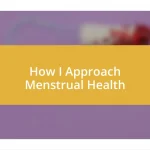Key takeaways:
- Reproductive health advocacy involves understanding personal needs, engaging in community resources, and sharing knowledge to enhance access and support.
- Effective self-advocacy requires reflection on health needs, gathering reliable information, and open communication with healthcare providers.
- Building a supportive network, whether through friends, social media, or local organizations, is crucial for sustaining long-term health practices and fostering empowerment.
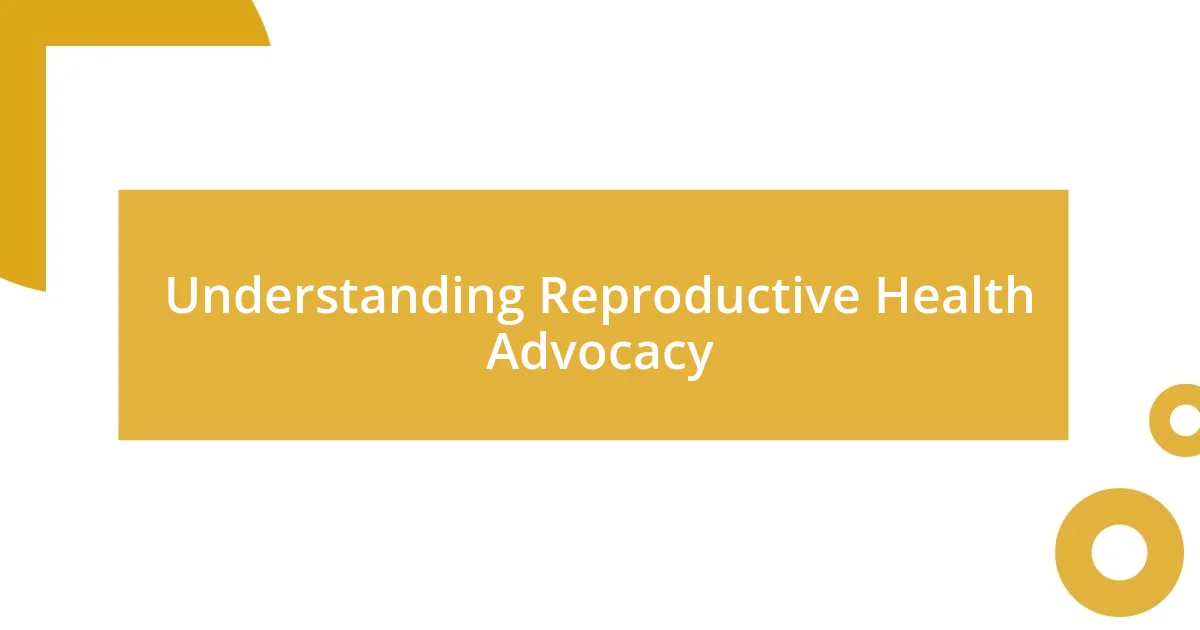
Understanding Reproductive Health Advocacy
Understanding reproductive health advocacy is about recognizing the importance of individual choice and access to comprehensive care. I often think about my friends who faced challenges in finding the right resources. It makes me wonder: how many people don’t speak up because they feel uninformed or unsupported?
Advocacy means more than just knowing your rights; it’s about actively engaging in conversations that shape policies and influence access. I vividly remember attending a local health seminar where a passionate speaker shared her own experiences navigating the system. Her story resonated deeply with many of us, illustrating how personal experiences can fuel the fire for change.
Moreover, understanding reproductive health advocacy involves empathizing with the diverse needs of different communities. I recall volunteering at a clinic and hearing the struggles of young mothers seeking education on their options. It struck me: when we advocate, we are not only voicing our own concerns but amplifying the voices of those who often go unheard. How can we create a more inclusive dialogue in our own circles?
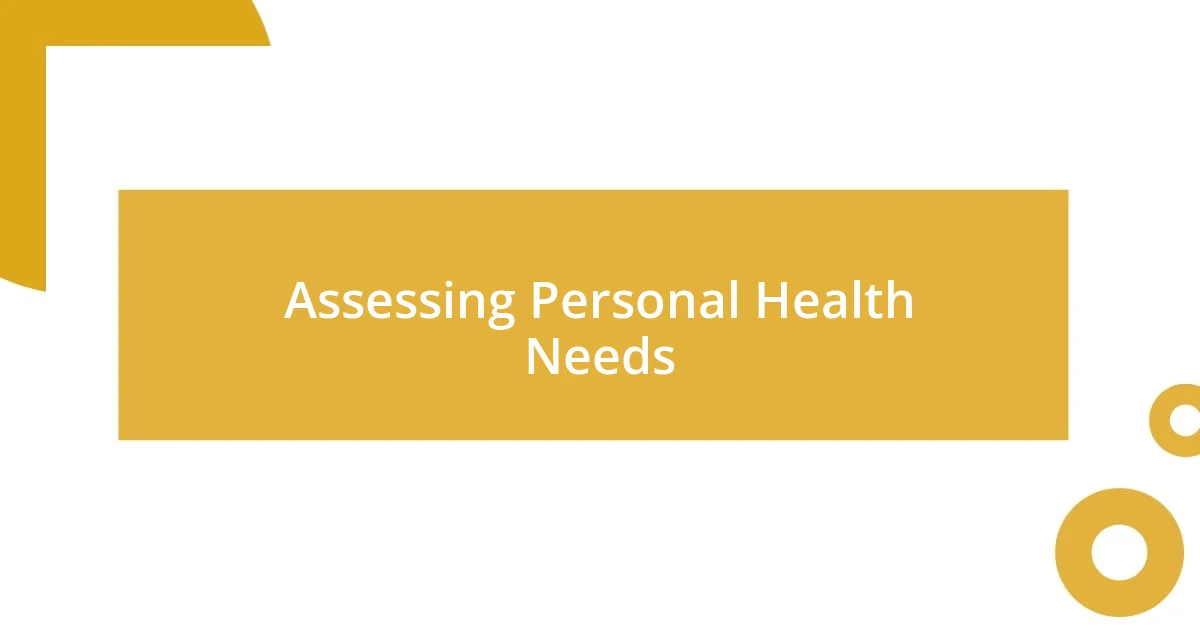
Assessing Personal Health Needs
When it comes to assessing personal health needs, I believe the first step is reflection. Think about what you truly require to feel healthy and informed. For example, I’ve had periods where my menstrual health felt off, and I realized I needed to delve into underlying conditions. Listening to my body and acknowledging those signs was crucial because neglecting them can lead to more significant issues down the line.
On another note, gathering reliable health information is essential. I remember sifting through countless articles and studies just to understand my options better. It was overwhelming, but I learned to differentiate between credible sources and misinformation, which was key in understanding my health needs. It’s easy to feel lost, but arming yourself with the right knowledge can be incredibly empowering.
Lastly, I find that talking to healthcare providers plays a vital role in this assessment. One time, during a routine check-up, I brought up concerns that, honestly, I thought were trivial. To my surprise, my doctor took them seriously and recommended tests I hadn’t even considered. That experience showed me that being open about my needs can lead to proactive care and better outcomes. So, don’t hesitate—be your own advocate.
| Health Need | Reflection |
|---|---|
| Understanding Body Signs | Identifying symptoms and their implications |
| Gathering Information | Distinguishing credible sources from misinformation |
| Engaging with Healthcare Providers | Open communication can lead to proactive care |
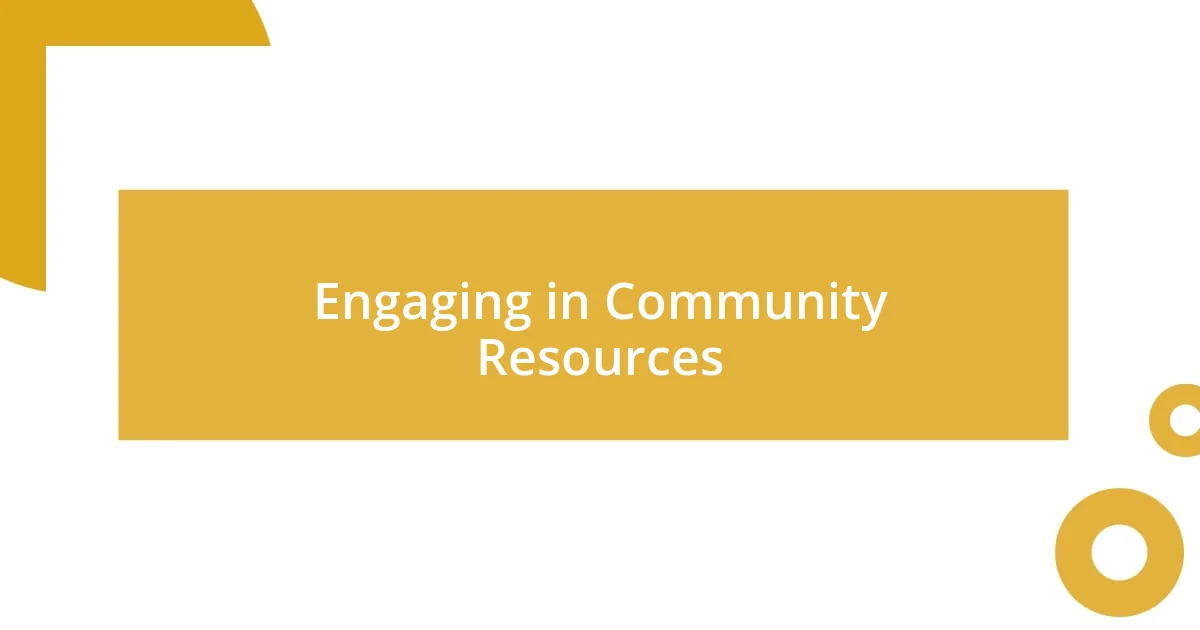
Engaging in Community Resources
Engaging with community resources has been a game changer in my journey towards reproductive health advocacy. I’ve discovered various organizations in my area that offer workshops and support groups, creating a network of shared experiences. For instance, I attended a community program focused on reproductive rights, where I was surprised by the depth of knowledge everyone brought to the table. It felt uplifting to connect with others who shared our struggles, and it reminded me just how vital local resources can be in fostering a sense of belonging and empowerment.
- Local clinics often offer free or low-cost services, making healthcare more accessible.
- Support groups provide emotional safety, allowing individuals to express their concerns and share insights.
- Workshops on reproductive health help demystify medical terminology and procedures.
- Community activism can lend strength to one’s voice, opening doors to advocacy opportunities.
- Online forums can connect you to a broader community, offering additional support and resources.
I’ve seen firsthand how community engagement invites collaboration and creativity. At a recent event, I met a woman who had successfully organized a local health fair that provided vital information and screenings for underrepresented groups. Her determination inspired me to think about how I could contribute similarly. By pooling resources and talents, we can better equip ourselves and each other for real change.
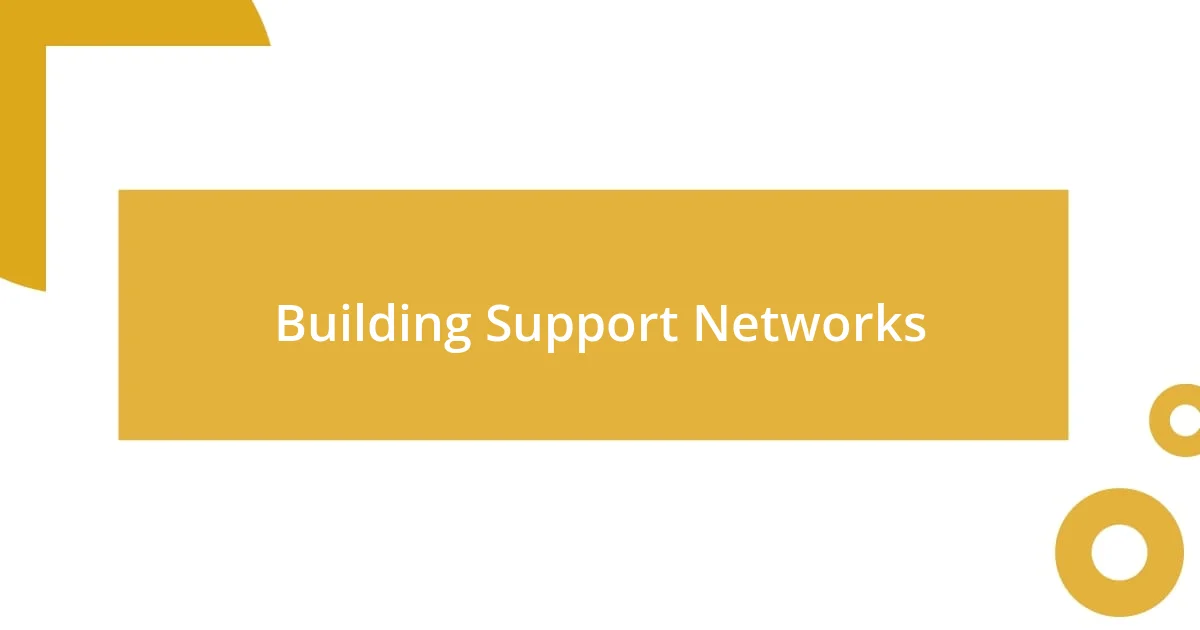
Building Support Networks
Building a support network can be incredibly transformative for anyone advocating for their reproductive health. I’ve often found that the friends and family who share their own experiences can be the best resource. For instance, after sharing my struggles with hormonal imbalances with a close friend, she revealed her own journey with similar issues. This connection not only made me feel understood but also opened up a dialogue about self-care strategies that I hadn’t considered. Isn’t it remarkable how vulnerable conversations can lead to such valuable insights?
I also turned to social media to expand my network beyond my immediate circle. Joining online groups focusing on reproductive health has been enlightening. During one discussion thread, someone bravely shared their story of navigating a recent diagnosis, and I was struck by how authentic and supportive the response was. It felt like a community rallying together, reminding me that sometimes, the best encouragement comes from those who truly understand what you’re going through.
Moreover, I learned the importance of forming connections with health professionals who emphasize a collaborative approach. In one particularly eye-opening visit, I met with a nurse practitioner who encouraged me to express all my questions and concerns without judgment. I left that appointment feeling empowered, equipped with both answers and more questions to explore. It taught me that building these networks is not just about gathering information—it’s about cultivating relationships that inspire confidence in taking charge of my health.
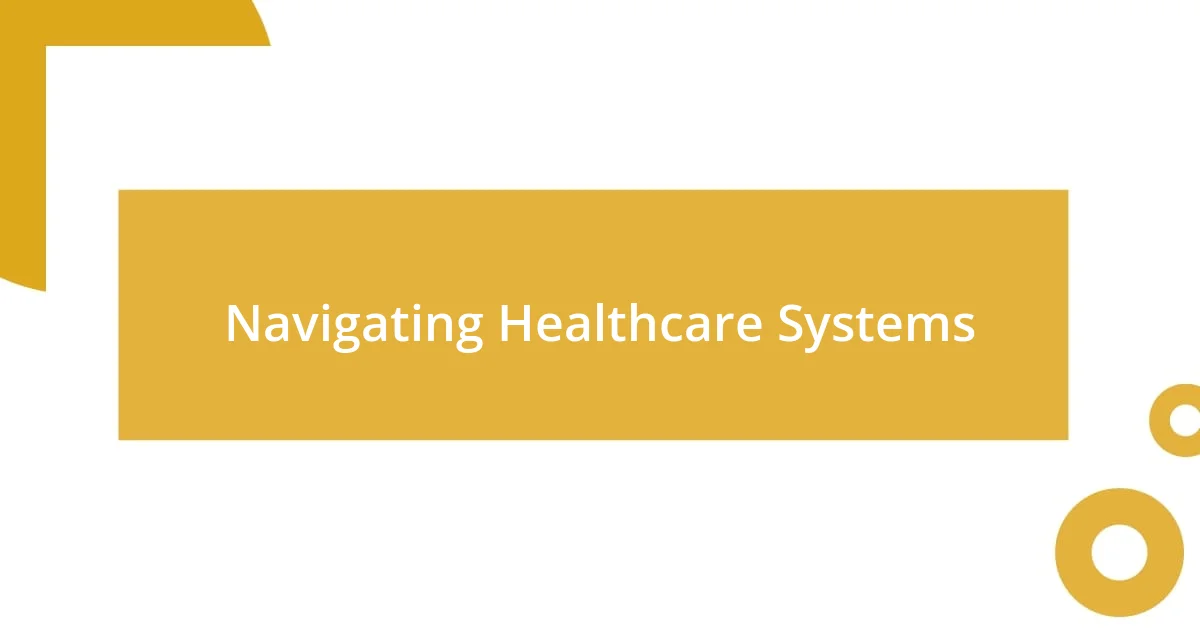
Navigating Healthcare Systems
Navigating healthcare systems can feel overwhelming since each system has its own rules, jargon, and players. I remember feeling lost during my first visit to a new clinic; the intake forms seemed endless and the terminology made me second-guess my understanding. Have you ever felt that way, wondering if you’d missed something important simply because you didn’t understand the process? I realized that taking a moment to breathe and ask questions, no matter how basic, was crucial in gaining better clarity about my reproductive health.
It’s also essential to understand what your insurance covers. When I first started my journey, I was surprised to discover that many services were classified differently than I expected. For instance, I had assumed a routine check-up would be fully covered, only to find a hidden copay in the fine print. Knowledge is power—by proactively contacting the insurance company and asking about coverage specifics, I was able to advocate for myself in a much more effective manner.
Lastly, building a relationship with your healthcare provider can significantly ease the navigation process. I vividly remember when I switched to a new gynecologist who encouraged open and honest communication. This simple shift transformed my visits; instead of feeling like a checklist item, I felt like a partner in my own care. Isn’t it remarkable how a supportive environment can change everything? By finding a provider who respects your voice and your journey, you create a foundation for better advocacy in the healthcare system.
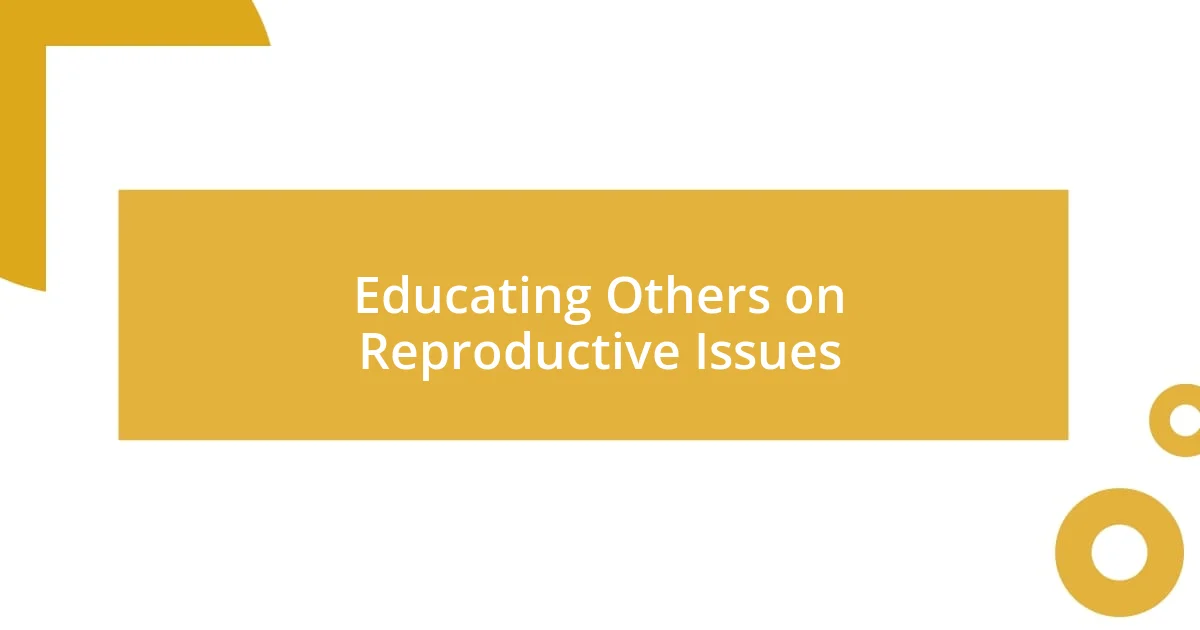
Educating Others on Reproductive Issues
Educating others on reproductive issues is an essential part of advocacy that I have cherished. I recall a particular moment when I hosted a small gathering focused on sharing knowledge about contraception options. The conversations became eye-opening, and I was amazed to see friends grappling with misconceptions they had carried for years. This experience made me realize that sometimes, just sparking a discussion can unravel myths and foster a sense of community support. Have you ever found yourself surprised by how much people genuinely want to learn when given a safe space?
Furthermore, social media has become a pivotal tool for educating others in my journey. I once created a post about the importance of understanding menstrual health, sharing not only data but personal anecdotes too. The responses poured in—some shared their experiences navigating painful periods, while others expressed gratitude for shedding light on something they thought was taboo. It’s incredible to witness how a simple online post can help demystify complex topics and encourage others to engage in their own reproductive health discussions. Have you thought about how social platforms can serve as venues for such important conversations?
Lastly, I’ve found that collaborating with local organizations amplifies the impact of education. During a health fair event, I partnered with a nonprofit to deliver workshops aimed at empowering young people about reproductive rights and options. The questions we received were heartfelt and often came from a place of curiosity mixed with fear. It reminded me of my own experiences, feeling vulnerable while seeking knowledge. Educating others isn’t just about imparting facts—it’s about creating space for honest discussions and providing support for those who might feel isolated in their journey.
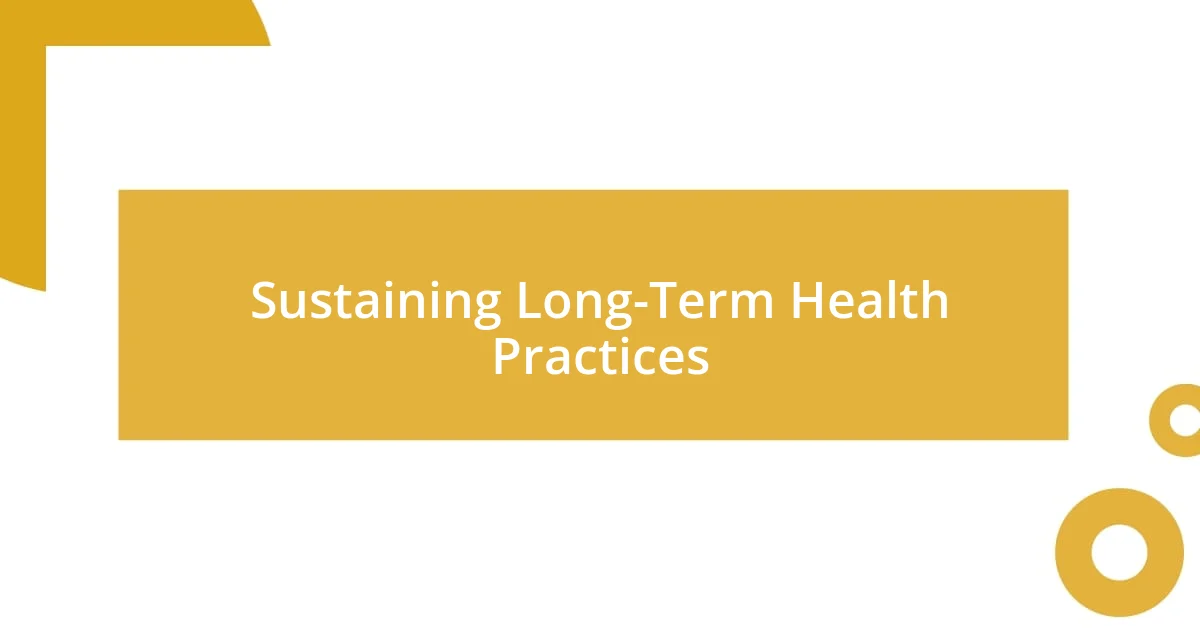
Sustaining Long-Term Health Practices
Sustaining long-term health practices requires intention and consistency. I learned the hard way that it’s easy to get swept up in the moment and overlook the importance of routine. After a particularly stressful year, I decided to establish a regular self-care practice that includes exercise and mindfulness. Have you ever found that small, daily habits can dramatically shift your overall well-being? For me, even just a 10-minute morning stretch has made a world of difference.
Tracking my health has also played a crucial role in sustaining these practices. I remember when I first started using a health app, eagerly logging my meals and workouts. At first, it felt like a chore, but soon, I discovered it was enlightening to see patterns emerge over time. I could identify what truly worked for my body, from foods that boosted my energy levels to workouts I genuinely enjoyed. I often ask myself, how can I tailor my journey based on my own data? The answers lie in those records—transforming the process from mere tracking to being an active participant in my health decisions.
Additionally, community support has been pivotal. I joined a local wellness group that meets weekly. At our first meeting, I was shocked by how open everyone was about their struggles and triumphs. It made me realize the kind of accountability that comes from sharing our journeys with others. Have you ever felt that collective energy in a group setting? It’s unmatched. The encouragement and shared resources have not only motivated me to stick with my practices, but they’ve fostered friendships that keep me grounded in my advocacy for my health.











